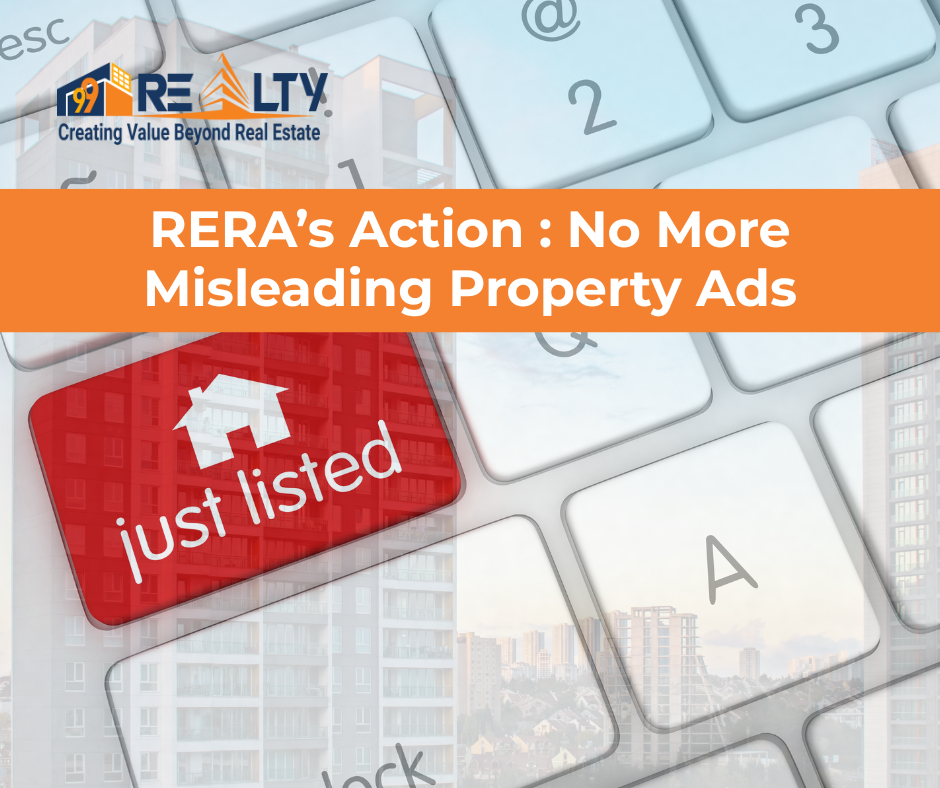Buying a home in India is a dream for millions. But that dream often begins with a glossy promise—billboards that scream luxury, TV ads dripping with drama, and digital campaigns that showcase lifestyle utopias. For years, Indian homebuyers have fallen prey to these exaggerated, misleading real estate advertisements.
But the tide is turning.
With the recent rollout of stricter advertising regulations by RERA, the Real Estate Regulatory Authority is finally stepping in as the much-needed watchdog. These rules don’t just aim to protect buyers—they’re meant to rebuild trust in a sector plagued by manipulation and misinformation.
Let’s break down the roots of the problem, the new rules, their implications, and the road ahead for fair real estate advertising in India.
Benefits of the RERA Act for Homebuyers
Understanding Misleading Real Estate Advertisements
What Qualifies as Misleading?
Misleading ads are like wolves in sheep’s clothing. They make promises the developer can’t—or won’t—keep. From showing amenities that don’t exist to promising impossible completion dates, these ads are crafted more for sales than for truth. It’s advertising, yes—but with a dangerously fine line between aspiration and deception.
Flashy Ads vs. Factual Ads: A Side-by-Side Comparison
| Aspect | Flashy Ads | Factual (RERA-Compliant) Ads |
|---|---|---|
| Visuals | Heavily edited images, drone shots not related to property, enhanced landscapes, glamour models | Actual site photos, 3D render videos and images based on approved plans, real construction status |
| Language | Vague and aspirational phrases like “Here or No where”, “Live Life King Size” | Clear, objective phrases like “2BHK, 850 sq. ft. carpet area as per RERA-approved plan” |
| Celebrity Influence | Endorsements by actors or influencers to build hype | Information-focused, with the project speaking for itself |
| Location Details | “2 mins from airport” (no mention of traffic or actual distance). No Proper Distance Mentioned. | “3.5 km from Chennai Airport (as per Google Maps)” |
| Amenities | “150+ world-class amenities” (without proof) | Only amenities approved in sanctioned layout plans are listed |
| Legal Disclosures | Often missing or hidden in fine print | Clearly displays RERA registration number, QR code, and project status |
| Pricing & Offers | “Book for ₹1000*” with hidden terms | Transparent pricing with breakup of base price, GST, maintenance, and registration fees |
| Delivery Timeline | Overly optimistic timelines (“Possession in few months!”) | As per actual RERA-approved possession schedule |
| Developer Credentials | Brand-heavy promotion, less about credibility | Full disclosure of developer name, office address, RERA ID, and past track record |
| Fine Print & Terms | “T&C Apply” used to bury important exclusions | Key conditions are mentioned upfront with a link to detailed terms |
| Trust Factor | Built on emotions and aspirations | Built on legal compliance, transparency, and verified facts |
Why RERA’s Intervention Matters
The Legal Mandate of RERA
The Real Estate (Regulation and Development) Act, 2016 (RERA) was brought in to protect homebuyers and bring transparency. It mandates all real estate projects to register and share authentic information with buyers. The law isn’t just a guideline—it’s a safety net.
Understanding RERA Escrow Account: Safeguarding Homebuyers
RERA Tamil Nadu’s Latest Guidelines
Tamil Nadu RERA rolled out specific regulations to stop misleading ads.
Key Highlights of the Advertisement Guidelines
- Every ad must mention the RERA registration number.
- Only approved project components (like actual amenities and carpet area) can be mentioned.
- Incomplete or under-registration projects cannot be marketed.
- Exaggerated visual representations or stock renderings are banned.
These steps aim to clean the narrative in real estate communication—and hopefully prevent heartbreaks caused by dishonest promotions.
Real Case Studies
Case: Chennai’s Luxury Project with No Approvals
In late 2023, a prominent Chennai-based developer was found advertising a “beachfront luxury enclave” with infinity pools and rooftop gardens. But guess what? The land didn’t even have basic CMDA (Chennai Metropolitan Development Authority) approval. RERA fined the builder and banned further promotions until compliance was ensured.
The Gurgaon Penalty: A Costly Lesson
In Gurgaon, a developer was slapped with a ₹25 lakh fine for advertising amenities that didn’t exist in the approved plan. The ad boasted of a school, clubhouse, and sports facilities—none of which were actually part of the project. The penalty sent a strong message: exaggeration comes at a price.
Maharashtra’s Mass Fines
Maharashtra’s RERA authority fined developers of 628 projects for failing to display registration numbers and QR codes in their ads. The total penalty? Nearly ₹89 lakhs. This mass action showcased the seriousness of the crackdown and the scale of non-compliance.
The Pan-India Perspective
Across India, authorities are waking up to the problem. In Uttar Pradesh, developers faced penalties for promoting unregistered projects. The Advertising Standards Council of India found that 34% of real estate ads in Maharashtra violated the law—evidence that misleading ads are a nationwide issue.
RERA’s Crackdown: A Much-Needed Game-Changer
What’s New in the Guidelines
Recently Tamil Nadu RERA’s latest rules make misleading real estate ads not just unethical—but illegal. Here’s what’s mandatory now:
- RERA registration number must be visible (minimum font size: 12 in print, 50% of project name in hoardings).
- Scannable QR code leading to the official RERA portal.
- No vague or unverifiable claims (e.g., “100+ amenities” must be backed by approvals).
- Exact physical distance, not time, from landmarks.
- Complete promoter details: name, address, contact.
- Reasons for exemption, if the project is not registered.
- Media accountability: even publishers can be penalized for running non-compliant ads.
How This Differs from the Past
Earlier, most of this information was optional, hidden, or left to buyer diligence. Now, transparency is non-negotiable. Developers, ad agencies, and even social media influencers are under legal obligation.
Trust & Transparency Are Paving a New Future for India’s Real Estate
The Negative Impact of Misleading Ads
1. Financial Losses for Buyers
Many buyers invest their life savings based on false promises. Projects get delayed, amenities are missing, or legal issues stall possession—resulting in financial setbacks, loan burdens, and unlivable conditions.
2. Crumbling Public Trust
When projects fail to deliver what’s promised, it doesn’t just affect one builder—it tarnishes the whole sector. This mistrust discourages genuine investors and slows down economic activity.
3. Legal & Emotional Turmoil
Victims of misleading ads often face years of legal battles. Beyond the financial toll, the stress, uncertainty, and social consequences can be overwhelming.
Has the Crackdown Made a Difference?
Yes—But Challenges Remain
Many developers have now started following RERA norms. QR codes, registration numbers, and factual disclaimers are slowly becoming common.
But some continue to bypass rules using:
- Coded project name
- Ambiguous influencer promotions without legal disclosures
Also, enforcement varies from state to state.
What Does Honest Real Estate Advertising Look Like?
The New Advertising Checklist
- RERA number and QR code (prominently visible)
- Actual, approved amenities only.
- Clear mention of construction status and expected possession date.
- Transparent pricing, no hidden charges
- Promoter contact info and details.
- No stock images representing the actual project or “conceptual visuals” without disclaimers
Honest ≠ Boring: Ethical Can Still Be Impactful
Being honest doesn’t mean being boring. We still tell stories—but they’re stories grounded in truth, customer experiences, and real milestones. Because buyers don’t need fantasy—they need facts they can rely on. Emotional appeal doesn’t have to mean deception.
Conclusion: 99 Realty’s Promise—No Tricks, Just Trust
We at 99 Realty wholeheartedly welcome RERA’s crackdown on misleading real estate ads. Why? Because we’ve never believed in gimmicks to begin with.
Our commitment is simple:
✔ Say what we mean
✔ Deliver what we promise
✔ Protect every buyer’s trust
We believe that real estate is not just about properties—it’s about people, families, and futures. And building that future starts with truth.
So when you see a 99 Realty project, know this: It’s real. It’s verified. And it’s yours to believe in.
FAQs
1. Is RERA compliance mandatory for all real estate ads in India?
Yes. Every ad must display the project’s RERA registration number, a QR code, and promoter details—regardless of the platform.
2. How can I verify if a real estate project is genuine?
Visit your state’s official RERA portal (e.g., https://jharera.jharkhand.gov.in/ for Jharkhand) and enter the registration number to check project status, approvals, and timeline.
3. Are developers fined for breaking ad rules?
Yes. Penalties range from ₹10 lakhs to ₹50 lakhs, and in severe cases, developers can be blacklisted or banned from advertising.
4. Do influencers need to follow RERA rules when promoting real estate?
Absolutely. Influencer marketing is treated like any other form of advertising.
Need Help?
Need help evaluating a property or planning your next move in the market?
Reach out to 99 REALTY – your trusted real estate partner for smarter choices.
Subscribe to get updates on our latest posts and market trends.






Join The Discussion